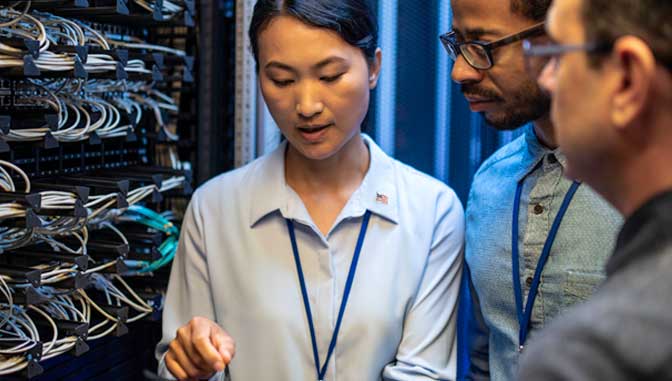Female Veterans – Ready to Fill Cybersecurity Jobs!

*The original article first appeared in “United States Cybersecurity Magazine,” Spring 2019 issue. It has been adapted and republished here with permission.
Current State of the Cybersecurity Industry
The growth in cyber threats has created a robust cybersecurity labor market with various well published reports estimating 3.5 million cybersecurity jobs will be unfilled by 2021. Although cybersecurity is a promising career path, it lacks gender diversity. Globally, women lack representation in the cybersecurity profession, accounting for only 11–14 percent over the past five years. For example, research from Cybersecurity Ventures predicts women will represent over 20 percent of the global cybersecurity workforce by the end of 2019. Although this is a promising statistic, 20 percent is still too low for global estimates.
One way for the cybersecurity industry to address the workforce shortage and gender diversity challenge is to focus on hiring female veterans who have served in the United States Armed Forces. According to the U.S. Department of Veterans Affairs, there are over 20 million veterans in the U.S. and female veterans account for 9 percent of the veteran population. That’s almost 2 million female veterans who are highly skilled and have received specialized training in fields that are applicable to meet the demanding cybersecurity jobs the industry is seeking to fill.
Some Challenges Facing Female Veterans Entering the Cybersecurity Workforce
Female veterans are fortunate to have practical experience and possess the same technical and soft skills (e.g. leadership, problem-solving, critical thinking, etc.) as many of their male counterparts. However, many of these women face challenges finding employment in the cybersecurity industry. Challenges such as discrimination, lack of understanding transferable skills, and unstable employment are serious barriers female veterans must overcome to have a successful cybersecurity career path.
Oftentimes discrimination against female veterans is more pronounced because the military is male-dominated and female veterans are considered a minority in the overall veteran population. However, there are several cybersecurity organizations that have been created in the last 5–7 years, such as Women in Cybersecurity (WiCyS) and the Women’s Society of Cyberjutsu (WSC). These organizations provide supportive networks for women in the cybersecurity field. These organizations help women to build their professional networks. Additionally, they function as support for mentorship, training, knowledge-sharing, and employment opportunities.
Another challenge for female veterans is there’s no direct mapping of military careers to current cybersecurity jobs. These jobs would allow veterans to express their transferable skills on their resume. The lack of understanding by many employers when it comes to hiring veterans gets further complicated when the veteran is unable to articulate the importance of their military jobs. Also, employers often do not understand how their skills are applicable to the cybersecurity domain.
Finally, female veterans tend to experience higher unemployment than their male veteran peers, which is concerning since many female veterans may be the main provider of their household and/or a caregiver of a family member. According to Hire Heroes USA, “post-9/11 veteran unemployment rate of 5.6% for women remains higher than the 3.6% national average.… women veterans are also between two and four times more likely than non-veteran women to experience homelessness.” These statistics are extremely troubling considering cybersecurity jobs are growing at exponential rates with starting salaries that tend to be higher than the average salaries in other fields. According to Indeed, a job-search engine, the average starting salary for an entry-level cybersecurity analyst is over
$56K annually; these salaries tend to increase with added experience, training, academic credentials, and/or industry certifications.
Female Veteran Military Careers That Are Transferrable to Cybersecurity
Several popular military career fields for women provide the knowledge, skills, and abilities (KSAs) for them to thrive in the cybersecurity industry. Military career fields such as intelligence, engineering, and applied science, as well as computers and computer science consist of technical work roles that are “more compatible” to the cybersecurity field. However, cybersecurity is a multi-disciplinary field. Female veterans with experience in public affairs, marketing, and multimedia can apply their KSAs toward cybersecurity jobs that utilize social media and digital marketing. Veterans from these careers understand how to leverage social media to elevate business content while keeping information and business profiles secure on the Internet. Given the amount of cyber-attacks that have occurred over the past 5 years that have led to public data breaches of over 200 million records (e.g. Equifax, Target, and OPM), having personnel who are well-versed in public relations, communications, and personnel records are key to protecting corporate brand and instilling public confidence.
Another popular career for female veterans is within health care. Female veterans who have training in counseling and social work may not seem like an ideal fit for cybersecurity jobs; however, studying human behavior as it relates to cybersecurity has become a growth area. According to IBM’s Cyber Security Intelligence Index, it was revealed that over 90 percent of cyber breaches occur because of human error. Jobs like behavioral analysts and other titles associated with human behavior (e.g. behavioral analytics, human-computer interaction, etc.) are needed more than ever to combat human cybersecurity challenges.
Finally, female veterans who have training in career fields such as logistics, transportation, and maintenance are essential to the growing cybersecurity critical infrastructure sectors, which consist of the most essential aspects of our society to include energy, financial services, transportation, and emergency services. Female veterans who have knowledge, skills, and abilities to assess risk, manage complex systems, and are trained to respond to incidents would be prime cybersecurity candidates to protect and defend these most vital assets.
Conclusion
Cyber threats are increasing in volume, velocity, and veracity. Therefore, it is imperative to fill cybersecurity jobs with talented, skilled individuals who possess the requisite experiences, knowledge, and training necessary to meet our national security needs. In addressing diversity and talent, female veterans can address the cybersecurity workforce and diversity needs. Study a Bachelor of Science in Cybersecurity.



